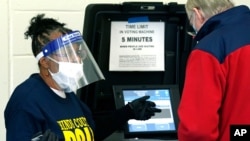U.S. security and intelligence officials claimed a partial victory in the country’s nationwide elections Tuesday, assuring voters they had aggressively turned back assaults on voting infrastructure even as they braced for a wave of disinformation operations from foreign adversaries.
The strongest statement came from U.S. Cyber Command chief Gen. Paul Nakasone, who said efforts to hack the election were dealt a decisive blow before lasting damage could be done.
“I'm confident the actions we've taken against adversaries over the past several weeks and months have ensured they're not going to interfere in our elections,” Nakasone, who also serves as director of the National Security Agency, said in a statement issued late Tuesday.
“When it comes to those who threaten our democratic processes, we are equal opportunity disruptors,” Nakasone said, vowing future attacks would be met just as forcefully.
“Our work does not end on November 3,” he said. “We're going to take action against any nation state or actor who attempts to interfere.”
Election security officials with the Cybersecurity and Infrastructure Security Agency (CISA) echoed Nakasone’s confidence in a series of media briefings throughout the day Tuesday, telling reporters years of preparations and investment in paper back-ups, had paid off.
"We're not soft targets here,” a senior CISA official said, speaking only on the condition of anonymity, telling adversaries, “You're going to have to bring a better game to the fight next time."
In the weeks leading up to Tuesday’s nationwide vote, U.S. intelligence officials acknowledged two attempts to meddle, one by Iran and another by Russia.
In both cases, they said hackers were able to steal information related to voter registration databases, with the Iranians managing to infiltrate one state’s database and use that information as part of a disinformation campaign.
After voting ended late Tuesday, security officials said they were now bracing for more disinformation campaigns from Iran, as well as from Russia, China and other adversaries.
Only this time, they say the efforts will be aimed at capitalizing on days of uncertainty surrounding the final result, due to tight races in some states with large numbers of mail-in ballots, to undermine American confidence in the democratic process.
"The attack surface is shifting from the actual voting process itself into the counting, the canvassing, the auditing and through the certification over the next several days and weeks," the senior CISA official said.
"You could potentially see [website] defacements, manipulating counts on certain websites or even on media,” the official warned. "You could see denial of service attacks...You could see disinformation campaigns out there amplifying or pushing false results or outcomes."
Officials and experts said they saw some evidence of the disinformation campaigns as polls began to close on Tuesday, especially from Russia’s state-backed media outlets like RT and Sputnik.
“We’ve seen a bit of Russian amplification of some of the voter fraud/intimidation claims, particularly in Pennsylvania,” Bret Schafer, a digital disinformation fellow with the Washington-based Alliance for Securing Democracy, told VOA via email.
“But that really pales in comparison to the domestic misinformation and disinformation right now,” he said, cautioning foreign efforts likely “will ramp up significantly in the next few days as things start to shake out and narratives take hold.”
Other experts also warn U.S. adversaries are likely biding their time, content to take advantage of the existing American disinformation ecosystem.
“The foreign actors only have to amplify the things certain domestic actors are saying,” said Nina Jankowicz, a Disinformation Fellow at the Washington-based Woodrow Wilson International Center for Scholars.
“There's a lot more to be gained in the post-election-day period in terms of inspiring greater distrust in the democratic system for the long term,” she said.
U.S. election security officials late Tuesday repeated warnings about any information coming from Russian media outlets, or those backed by Iran and China, describing it as a “steady drumbeat of disinformation.”
"These are organs of the state. These are mouthpieces of the state,” the senior CISA official said. “Treat them accordingly … with a hefty, hefty, hefty dose of skepticism.”
Only counterintelligence officials have warned it is not just the so-called big three of Russia, Iran and China that have been seeking to influence the U.S. election and its aftermath.
They say as many as 30 countries have sought to influence the election, a list that includes U.S. allies like Saudi Arabia and Turkey, and adversaries like Cuba and Venezuela.
As of early Tuesday, officials said they were aware of at least one disinformation campaign targeting Chinese-American voters and were working with other government agencies and social media companies to address it.
According to the nonprofit investigative website ProPublica, at least two dozen groups on the Chinese-owned social media app WeChat were trying to intimidate voters by spreading rumors that U.S. officials were going to mobilize troops to put down impending riots.








